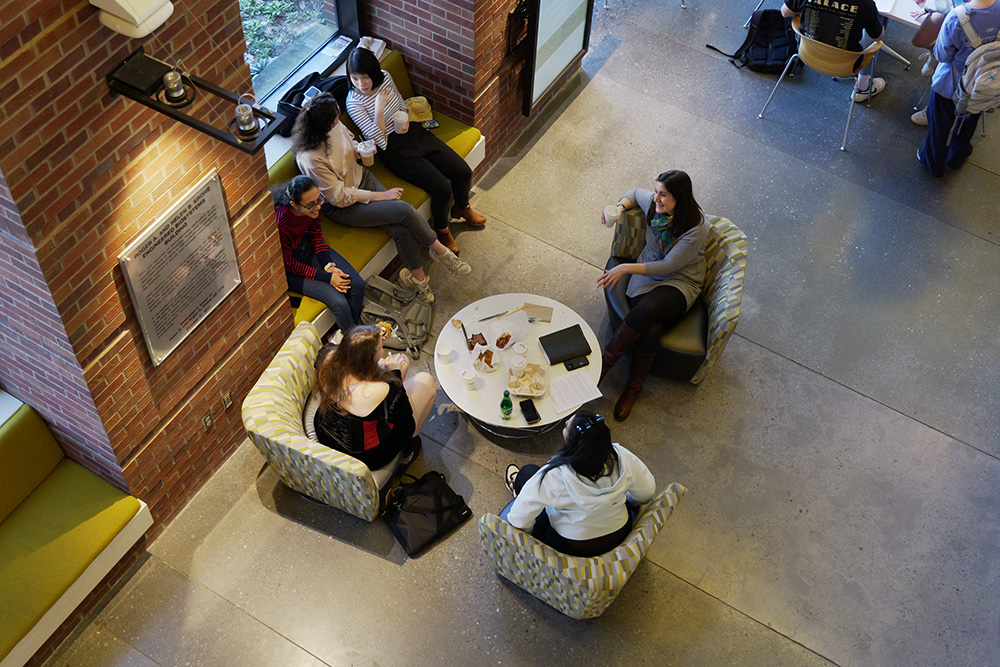
Apr 22, 2024
Breanna Shi, a student in the bioinformatics Ph.D. program, discovered the importance of student-led support groups early on in her graduate education journey. Since then, she has taken on a variety of mentorship roles, including co-organizing the 2024 Women Computational Biology Cohort with fellow Ph.D. bioinformatics student Zoey Yang.
Before the Women Computational Biology cohort, I felt a strong desire to have more community with my fellow graduate students,” said Shi. “The program has done so much to help women like Zoey and myself derive a sense of community in our work, and we want to be a part of seeing this community help the next generation of female scientists.
Shi and Yang share the importance of developing women-centered communities and provide their insight into developing a community.
Provide a safe space for discussion.
“Pursuing a graduate degree is difficult,” said Yang. “Pursuing a graduate degree as a woman is particularly hard. Women are often given specific expectations by our society. Pursuing advanced degrees may often be seen as ‘too ambitious’ or ‘unnecessary’ for women.”
In the cohort, Yang had the opportunity to meet other women scientists every month to discuss their experience in doing computational biology research.
“As women in male-dominated research areas, our experience and struggles are unique.”
The cohort provided a safe space to talk about different aspects of their prospective career, mental health, and life in general.
“We understand each other, and we support each other with constructive advice,” said Yang.
Meet with Like-Minded Peers of Diverse Perspectives.
According to Shi, the women in their cohort help each other navigate the academic environment, empowering them to tackle the challenges they will inevitably face in a Ph.D. program.
“I feel that women are better able to reach their goals through this program because of the diversity of perspective and experience levels that this program allows Ph.D. students to encounter,” said Shi. “Each woman in my cohort contributes a different perspective on her graduate experience, which collectively serves all new women graduate students to walk forward in her Ph.D. confident and prepared for the challenges she will conquer in her Ph.D.”
Walk away from meetings with a plan of action.
At the beginning of Shi’s third year, she was distressed. The idea for her thesis was not working, and she did not have any other ideas.
“I spoke to some of the women from my program that were able to help me feel more confident defending my ideas with my advisor,” said Shi. “At my next meeting, I was able to come to a consensus about a new direction to take my thesis. I brought this idea to my faculty mentor, and she helped to make a plan for my proposal and my first publication.”
Combat feelings of isolation.
For Shi, there were many times in the beginning of her Ph.D. when she felt isolated. She wondered if the challenges she was experiencing were normal.
Avery Davis Bell, postdoctoral scholar in the School of Biological Sciences, launched the Women Computational Biology Cohort with Professor Lynn Kamerlin to provide graduate women and gender minorities with a faculty mentor and to host events aimed at empowering these students.
“Conversations with Avery and other women in my cohort have completely changed my perspective on graduate school,” said Shi.
The advice given during their meetups have been invaluable to Shi’s growth and success as a Ph.D. student.
“Avery has been a huge advocate for me during this program,” said Shi. “She is always ready to give advice, support my ideas, and help me to grow as a female leader. She has actively shown me time and time again her passion for empowering the next generation of female scientists. I feel lucky to learn from her experience as I try to give back the experience I was given."
Launching Your Own Community.
Shi gives the following tips for starting your own community:
- Start with something simple. “Go get a cup of coffee with someone new in your department,” said Shi. “Find out what graduate students in your department need and find people who are willing to get the work done. It takes a good team to build a community.”
- Don’t be afraid to ask for help. “Your department is likely more than willing to help you start a new graduate community,” said Shi. “This will help you identify the people who are passionate about your ideas.
- Do the work to maintain your community. “The best strategy that you can have to create a supportive community is to realize that community building is an active role, not a passive role,” said Shi.
The 2024 Women Computational Biology Cohort will be accepting applications this summer. Applications are open to all women and gender minority Ph.D. students who research computational biology regardless of major. Faculty willing to serve as mentors and women interested in the program should email Breanna Shi.